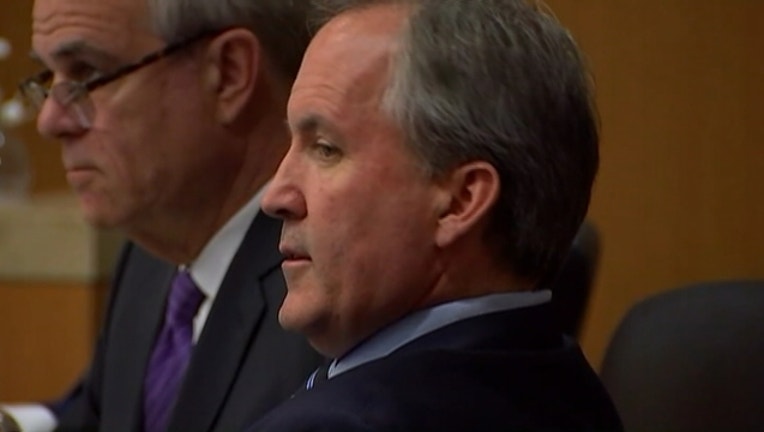Texas AG Ken Paxton whistleblowers sue for wrongful firing, retaliation

DALLAS - Four former deputies to Texas Attorney General Ken Paxton are suing him for wrongful firing and retaliating against them for reporting him to the FBI for alleged bribery and abuse of office.
Their lawsuit adds to the deepening legal and political peril for the high-profile Republican, who is facing calls for his resignation and a potential federal investigation over his staff's charge that he used his office to benefit a wealthy donor.
In September, top members of Paxton's staff reported him to federal authorities for alleged crimes they say he committed in assisting Austin real estate developer Nate Paul. Each of them has since resigned, been put on leave or been fired.
On Thursday, three of the lawyers who accused Paxton and the attorney general's former head of law enforcement sued, claiming Paxton ousted them as retaliation and then smeared them in the press and to lawmakers.
"Paxton responded to the report immediately and with ferocity, as though he was trying consciously to show Texans exactly what retaliation against whistleblowers looks like," states the complaint filed in a Travis County court.
Paxton's office and a lawyer for Paul did not immediately respond to requests for comment Friday. The attorney general has broadly denied wrongdoing and cast blame on "rogue employees and their false allegations."
The lawsuit paints a picture of the struggle between Texas' top law enforcement official and the employees convinced he's been breaking the law. It presents four instances in which the whistleblowers allege Paxton abused his position to help Paul and offers details that raise new questions, including Paxton allegedly "routinely cycling through `burner' cell phones."
Last year, the FBI raided Paul's home and offices as part of an investigation that's yet to result in any public charges.
The lawsuit says Paxton leaned on his deputies to green light the release to the developer's lawyers of state and federal records related to the searches. The whistleblowers, however, felt this would scuttle long-standing policies that exempt records tied to ongoing investigations from state public records law, "and likely spark innumerable lawsuits."
Paxton also directed his office to intervene in a civil case over a business dispute between Paul and an Austin charity, and ordered up a legal opinion that protected some of Paul's properties from being sold in foreclosure.
But the act that prompted Paxton's staff to report him was his hiring an outside lawyer to investigate Paul's claims that the FBI broke the law in searching of his home and offices. Paxton's staff concluded the allegations were outside their jurisdiction and unsupported by evidence, according to the complaint.
The outside lawyer obtained 39 grand jury subpoenas that were beyond "the appropriate scope" of the case, the complaint states. It says they appeared to be designed to aid Paul's various civil suits and "to harass law enforcement agents and federal prosecutors."
"Paxton and Paul were using their so-called `special prosecutor' to bring the weight of the OAG to bear on Paul's enemies," the complaint states.
The lawsuit does not detail a theory of why Paxton would be helping Paul, who gave him a $25,000 campaign donation in 2018. But it does say the men had regular meetings this year, usually without Paxton's security detail and without marking the meetings on the attorney general's official schedule. In a deposition last week, Paul said Paxton recommended a woman for her job with the developer's company. Paxton acknowledged having an extramarital affair with the woman, then a Texas Senate aide, in 2018 but said he ended it, according to two people who said the attorney general informed them of the relationship.
The lawsuit was brought by James Blake Brickman, David Maxwell, J. Mark Penley and Ryan Vassar. The first three were fired and Vassar was put on leave.
They are suing for reinstatement, lost wages and other damages. They've also asked local prosecutors to fine Paxton $15,000 for each violation of the Texas Whistleblower Act.

